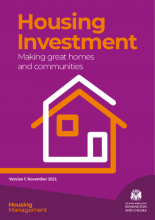Housing Investment Standard
Why an investment standard?
Our Council Plan contains a number of key priorities including maintaining our borough as a great place to live, work and learn, by providing decent, well-maintained housing.
To deliver this priority, the council has developed a Housing Investment Programme. This identifies the work needed to our housing and when it is planned to be done. The Housing Investment Standard drives the programme, keeping homes and estate environments in a good state and meeting the cuncil’s quality standard.
Under the Investment Standard, our homes will:
- be safe
- be in a good state of repair
- be sufficiently warm and dry
- be accessible
- have well-functioning facilities
- sustainable housing
The Standard also allows for investment in communal areas and the estate environment.
The Standard
This means that our buildings will:
Be safe: Homes must comply with statutory health and safety requirements including:
- undertaking Fire Risk Assessments and completing the actions identified in them
- carrying out asbestos surveys, completing any remedial actions they identify and monitoring ACMs (asbestos containing materials)
- carrying out annual gas servicing and safety checks
- regularly testing electrics (every five years) and completing any upgrade work
- regularly testing all mechanical and electrical assets (for example, passenger lifts receive a thorough inspection/examination every six months), and maintaining them with the aim of replacing at the end of their working lives
- being compliant with the access requirements under the Disability Discrimination Act
- maintaining water hygiene including the control of Legionella bacteria, identifying, assessing, preventing and managing the risk
- enforcing actions arising from Housing Health and Safety Rating System (HHSRS) assessment of health and safety risk
This means that homes will:
Be in a good state of repair – with homes kept wind and weather tight and free from water penetration including maintaining the integrity of:
- roofs
- windows
- doors
- building structure (including walls, balcony doors and balconies)
Be sufficiently warm and dry
- Boilers working efficiently and effectively
- Efficient and effective district heating systems with the means to control heating levels and individual metering
- Insulated walls and lofts
- Improving energy efficiency and reducing carbon emissions (for example energy efficient lighting/communal plant)
- Ducted ventilation systems in the absence of external or internal wall insulation
Be accessible (on a needs basis)
- An Aids and Adaptations service to help residents to remain in their homes where possible and practical
Have well-functioning facilities
- Kitchens and bathrooms are in good condition
Sustainable housing
- Efficient use of resources and energy with minimal impacts on the environment. Minimising waste, encouraged re-use and recycling together with lower lifecycle environmental impacts and cost, improved reliability, less maintenance and greater user satisfaction.
This means that communal areas will have:
- operational, adequate and working door entry systems
- non-slip flooring in communal areas
- adequate security measures
- emergency lighting
Estates will have investment to ensure:
- they are secure – estates will be adequately lit and signposted
- fencing, walls, estate roads, playgrounds, landscaping and structures are maintained to a safe standard

